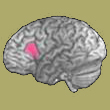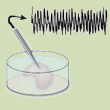Monday, 2 July 2012
Rethinking the Role of Broca’s Area in Language
 In 1861, Paul Broca observed a sizable lesion in the left inferior frontal cortex of a patient who had just died. This individual had been able to understand what was said to him, but had been unable to pronounce anything but the syllable “tan”. Subsequently, this same observation was confirmed in many other individuals, and Broca’s area, whose destruction results in this form of aphasia (now known as Broca’s aphasia), thus became associated with the production of language.
In 1861, Paul Broca observed a sizable lesion in the left inferior frontal cortex of a patient who had just died. This individual had been able to understand what was said to him, but had been unable to pronounce anything but the syllable “tan”. Subsequently, this same observation was confirmed in many other individuals, and Broca’s area, whose destruction results in this form of aphasia (now known as Broca’s aphasia), thus became associated with the production of language.
But the role attributed to Broca’s area has become far more complex since these initial observations were made. In addition to the production of language, this area is now also believed to be involved in certain semantic aspects of language. For example, Dr. Peter Hagoort’s research using brain imaging shows that the dynamic association of Broca’s area with the left posterior temporal cortex is necessary for understanding language. (more…)
From Thought to Language | Comments Closed
Monday, 25 June 2012
A Whole Hippocampus Reveals Its Secrets
 Some major scientific discoveries are the result not so much of a particular experiment as of the lengthy efforts to develop the protocol used in it. Such was the case for a study that Sylvain Williams published in Nature Neuroscience in November 2009. Williams and his team had worked for years to refine the method used in this study to record neuronal activity in a whole rat hippocampus preserved in vitro. (more…)
Some major scientific discoveries are the result not so much of a particular experiment as of the lengthy efforts to develop the protocol used in it. Such was the case for a study that Sylvain Williams published in Nature Neuroscience in November 2009. Williams and his team had worked for years to refine the method used in this study to record neuronal activity in a whole rat hippocampus preserved in vitro. (more…)
Memory and the Brain | 1 comment
Monday, 18 June 2012
Memories: Always a Work in Progress
 People tend to think that their memories are reliable and bear no resemblance to the false ones invented by people who suffer from confabulatory hypermnesia (severe false memory syndrome). But experiments using morally complex scenarios, such as those developed by psychologist Jonathan Haidt, have shown that normal subjects are surprisingly quick to invent explanations to justify intuitive moral stances, such as accepting the taboo against incest. (more…)
People tend to think that their memories are reliable and bear no resemblance to the false ones invented by people who suffer from confabulatory hypermnesia (severe false memory syndrome). But experiments using morally complex scenarios, such as those developed by psychologist Jonathan Haidt, have shown that normal subjects are surprisingly quick to invent explanations to justify intuitive moral stances, such as accepting the taboo against incest. (more…)
Memory and the Brain, The Emergence of Consciousness | 1 comment
Monday, 11 June 2012
The Phi Effect Is Not the Beta Effect!
 Science is not immune to historic errors that can be passed along for decades. One such error was the confusion of the phi effect with the beta effect, which persisted until Robert M. Steinman and his colleagues published their clarification in 2000.
Science is not immune to historic errors that can be passed along for decades. One such error was the confusion of the phi effect with the beta effect, which persisted until Robert M. Steinman and his colleagues published their clarification in 2000.
The phi effect was first described in Experimental Studies on the Seeing of Motion, a book published in 1912 by Max Wertheimer, one of the fathers of Gestalt psychology. The problem was that in his book, Wertheimer did not describe the conditions for the appearance of the phi effect precisely. He said that this phenomenon occurs when two lines are projected on a screen in very close chronological succession, thus creating the impression (under certain observation conditions that he left undefined) that a fuzzily defined area the same colour as the background is moving between these two lines. (more…)
The Senses | Comments Closed
Monday, 4 June 2012
Stress, Prefrontal Cortex Inhibition, and Depression
 Exposure to chronic stress has many harmful effects, including effects on our cognition and mental health. The June 2009 edition of Nature Reviews Neuroscience presents several articles summarizing the most recent research findings on this subject.
Exposure to chronic stress has many harmful effects, including effects on our cognition and mental health. The June 2009 edition of Nature Reviews Neuroscience presents several articles summarizing the most recent research findings on this subject.
One of these articles, by Amy F. T. Arnsten, shows how stress inhibits thinking, planning, and control activity in the prefrontal cortex, while strengthening the activity of the rapid reflex pathways connected to the amygdala and the subcortical structures associated with it. (more…)
Mental Disorders | Comments Closed







